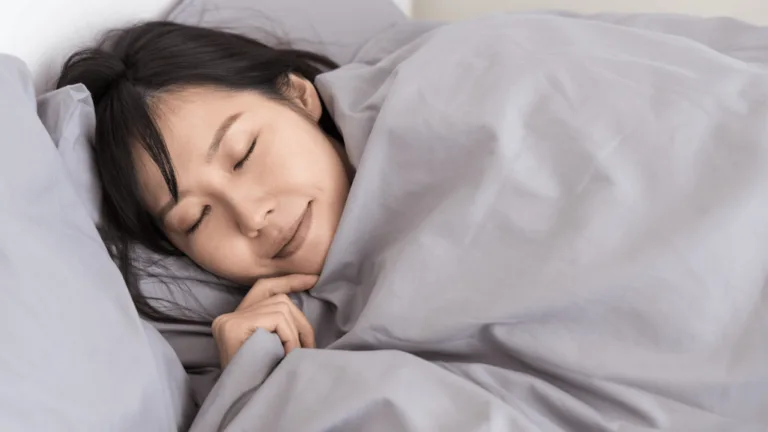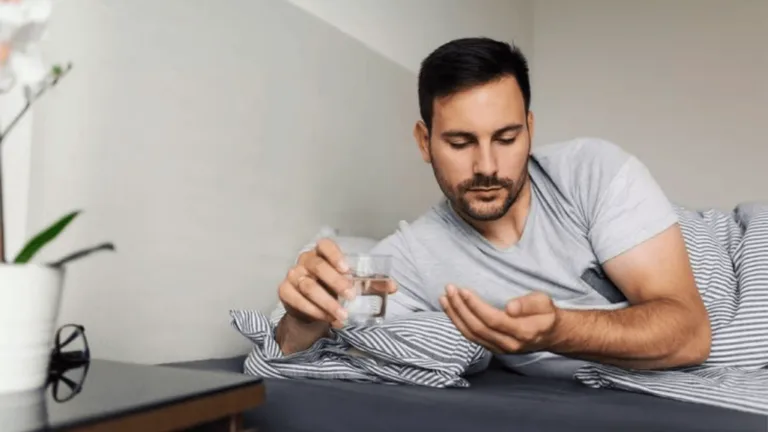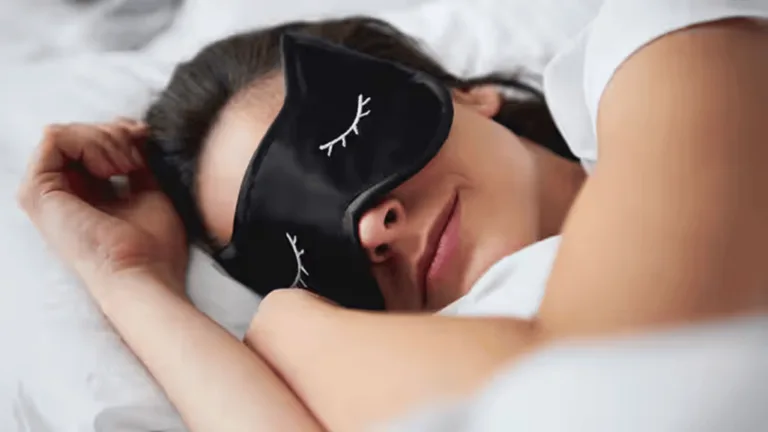Are you tossing and turning at night, struggling to get the rest you need? You’re not alone. Many adults find it hard to get the seven hours of sleep they need. But don’t worry – there are many natural sleep aids that can help you sleep better.
Home remedies for sleeping have been used for centuries. They can be as effective as over-the-counter sleep aids but without the risks. These solutions include herbal teas and relaxation techniques.
Insomnia remedies vary from person to person. What works for one might not work for another. It’s key to try different options and see what works for you. Some people find relief through meditation or yoga, while others prefer chamomile tea or lavender oil.
Good sleep hygiene tips are key to a restful night. This means having a calming bedtime routine, keeping your bedroom cool and dark, and avoiding screens before bed. These simple changes can help improve your sleep quality over time.
Key Takeaways
- Most adults need at least seven hours of sleep per night for optimal health.
- Natural sleep aids can be as effective as medication without the risk of side effects.
- Meditation and exercise have been shown to improve sleep quality.
- Herbal remedies like chamomile tea and lavender oil can promote relaxation.
- Consistent sleep schedules and good sleep hygiene are crucial for better rest.
- If sleep problems persist, consult a healthcare provider for professional advice.
Understanding Sleep Disorders and Their Impact
Sleep disorders affect millions of Americans, making their health and daily life harder. Up to two-thirds of adults have insomnia at some point, especially older people and those with anxiety or depression. Let’s look at the common symptoms, effects, and why good sleep is key.
Common Symptoms of Sleep Disorders
It’s important to know the signs of sleep disorders to get the right help. These signs include:
- Difficulty falling or staying asleep
- Waking up tired
- Frequent loud snoring
- Daytime sleepiness
- Gasping while sleeping
Effects of Poor Sleep Quality on Health
Poor sleep can lead to many health problems. Over 70% of high school students don’t get enough sleep, hurting their grades. Adults with sleep issues might struggle with:
- Difficulty concentrating
- Memory issues
- Increased risk of chronic conditions
- Compromised immune function
Importance of Quality Sleep for Overall Well-being
Good sleep is vital for feeling well. Most adults need 7-8 hours of sleep each night. Enough rest helps with:
- Immune system function
- Hormonal balance
- Heart health
- Cognitive performance
Looking into other ways to fight insomnia and find holistic sleep solutions can help. Changing your lifestyle, trying cognitive behavioral therapy, or using natural products like melatonin are some options to better your sleep.
Herbal Remedies and Natural Supplements for Better Sleep
Sleep troubles affect nearly half of Americans. Luckily, nature has herbal sleep supplements and calming supplements to help. Let’s look at some popular options that can improve sleep quality.
Chamomile Tea: A Soothing Bedtime Drink
Chamomile tea is a classic sleep aid. It has an antioxidant called apigenin that relaxes the body and mind. Drinking a warm cup of chamomile tea before bed can be a simple way to help you sleep better.
Melatonin: Regulating Sleep-Wake Cycles
Melatonin is a hormone that helps regulate sleep cycles. Almost two-thirds of American adults have tried melatonin to get better sleep. These supplements are great for those with jet lag or shift work sleep disorder.
Magnesium: The Mineral for Muscle Relaxation
Magnesium is key for muscle relaxation and sleep. Studies show it can help older adults with insomnia. But, it’s smart to talk to a healthcare provider before starting any new supplements.
Valerian Root: An Ancient Sleep Aid
Valerian root has been a sleep aid for centuries. It might boost GABA, a neurotransmitter that helps you relax. Taking 300 to 600 milligrams of valerian before bed can help some people sleep better.
Remember, sleep-inducing foods can also help. Tart cherry juice, for example, can increase melatonin levels naturally. Always use these natural remedies responsibly and talk to a healthcare professional before starting.
Relaxation Techniques to Promote Restful Sleep
Sleep problems affect many Americans, with a third of adults dealing with chronic insomnia. Stress and anxiety often make sleep poor. Luckily, there are relaxation techniques that can help improve sleep.
Breathing exercises are easy and effective for relaxation. The 4-7-8 method involves breathing in for 4 seconds, holding for 7, and breathing out for 8. This can calm your mind and body before sleep. Belly breathing, or diaphragmatic breathing, also helps reduce stress and relax you.
Mindfulness is becoming more popular for better sleep. Body scans, a type of meditation, focus on each body part to reduce tension and help you fall asleep. Yoga nidra, a meditative yoga practice, uses mental images and relaxation to calm you down and improve sleep.
Progressive muscle relaxation is a strong way to manage stress for better sleep. It involves tensing and relaxing muscle groups to lower body tension. When combined with other relaxation methods, it can greatly improve sleep quality over time.
| Relaxation Technique | Description | Benefits |
|---|---|---|
| 4-7-8 Breathing | Inhale for 4s, hold for 7s, exhale for 8s | Calms mind and body |
| Body Scan Meditation | Focus on each body part sequentially | Reduces tension |
| Progressive Muscle Relaxation | Tense and relax muscle groups | Decreases overall body tension |
Adding these relaxation techniques to your bedtime routine can greatly improve your sleep. Experts suggest doing these exercises for 20-25 minutes every day for two weeks to see the best results. Remember, being consistent is important for better sleep through relaxation and stress management.
Home Remedies for Sleeping: Lifestyle Changes for Improved Rest
Good sleep hygiene practices can greatly improve your sleep quality. By making simple lifestyle changes, you can improve your sleep satisfaction and wake up feeling refreshed. Let’s look at some effective tips you can start tonight.
Establishing a Consistent Sleep Schedule
Adults need seven to nine hours of sleep each night. Keeping a regular sleep schedule, even on weekends, helps your body’s internal clock. This consistency can make your sleep better over time.
Creating an Optimal Sleep Environment
Creating the right bedroom environment is key for good sleep. Keep your room dark, quiet, and cool. The ideal temperature is about 65°F (18.3°C) for most people. A medium-firm mattress can also help avoid back pain and improve sleep.
Limiting Screen Time Before Bed
Electronic devices emit blue light that can disrupt your sleep cycle. Start calming bedtime routines without screens. Try reading a book or relaxing techniques instead. A 2022 study found that bright light during the day can help improve sleep quality and length.
“Yoga has been shown to improve sleep quality, with over 55% of practitioners reporting better sleep.”
Small changes can lead to big improvements in sleep quality. By following these sleep hygiene practices and natural sleep remedies, you’re taking steps towards better rest and health.
| Sleep Improvement Tip | Benefit |
|---|---|
| Consistent sleep schedule | Regulates body’s internal clock |
| Cool bedroom (65°F/18.3°C) | Enhances sleep comfort |
| Limit screen time before bed | Improves melatonin production |
| Yoga practice | 55% report better sleep quality |
Essential Oils and Aromatherapy for Better Sleep
Aromatherapy is becoming a popular way to get better sleep naturally. Essential oils can make sleep more soothing. Let’s see how these oils can change your bedtime for the better.
Lavender Oil: A Popular Choice for Relaxation
Lavender oil is a top pick for sleep. A study in 2005 showed it made young, healthy people sleep deeper. It helps you fall asleep faster and sleep longer.
Other Calming Essential Oils for Sleep
But lavender isn’t the only oil that helps you sleep well:
- Chamomile: Reduces anxiety and improves sleep quality
- Bergamot: Helps decrease stress and promote relaxation
- Clary Sage: Shown to enhance relaxation in a 2013 study
- Sandalwood: Known for its sedative effects
Using a mix of chamomile, lavender, and neroli oils works great for anxiety and sleep. For more info on natural sleep solutions, check out this link.
Methods of Using Essential Oils for Sleep
Here are ways to use essential oils for sleep:
- Diffusing: Use an aromatherapy diffuser in your bedroom
- Topical application: Mix with a carrier oil and apply to skin
- Bath: Add a few drops to your evening bath
- Pillow spray: Create a DIY spray for your pillow
Always mix essential oils with a carrier oil before putting them on your skin. A good mix is 1 drop of essential oil to 1 teaspoon of carrier oil. Test it on a small area first to avoid any bad reactions.
| Essential Oil | Benefits | Best Use Method |
|---|---|---|
| Lavender | Improves sleep quality and duration | Diffuser or pillow spray |
| Chamomile | Reduces anxiety, promotes relaxation | Bath or topical application |
| Bergamot | Decreases stress, enhances mood | Diffuser or topical application |
| Sandalwood | Has sedative effects | Diffuser or topical application |
Conclusion: Implementing Natural Sleep Solutions for Long-term Benefits
Using non-pharmaceutical sleep aids can greatly improve your sleep. Herbal remedies and lifestyle changes are great options. For example, melatonin supplements help older adults with insomnia sleep better and feel more alert in the morning.
Adding sleep-promoting exercises and bedtime rituals can also help a lot. Light therapy, meditation, and yoga might improve your sleep. Don’t forget about aromatherapy – lavender oil can help older adults and those with insomnia sleep better.
When trying sleep supplements, be aware of possible side effects and interactions. High doses of magnesium might upset your stomach, and kava could harm your liver. Always talk to a doctor before starting any new supplements. By trying different natural methods and being patient, you can get better sleep and wake up feeling refreshed.











